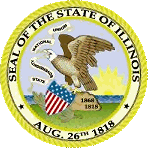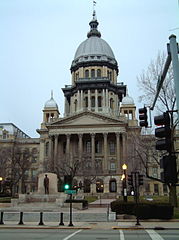July 8, 2014 •
Federal Suit in Maine Challenges Contribution Limits
A federal lawsuit was filed July 7, 2014, challenging certain provisions of Maine’s campaign finance law. Sections 1015(1) and 1015(2) of Chapter 21-A of the Maine Revised Statutes limit political contributions to a gubernatorial candidate from an individual, political committee, […]
 A federal lawsuit was filed July 7, 2014, challenging certain provisions of Maine’s campaign finance law. Sections 1015(1) and 1015(2) of Chapter 21-A of the Maine Revised Statutes limit political contributions to a gubernatorial candidate from an individual, political committee, corporation, or business entity to $1,500 in any election. Therefore, a candidate can collect a total of $3,000 from each contributor because there are ordinarily two elections – a primary election and a general election.
A federal lawsuit was filed July 7, 2014, challenging certain provisions of Maine’s campaign finance law. Sections 1015(1) and 1015(2) of Chapter 21-A of the Maine Revised Statutes limit political contributions to a gubernatorial candidate from an individual, political committee, corporation, or business entity to $1,500 in any election. Therefore, a candidate can collect a total of $3,000 from each contributor because there are ordinarily two elections – a primary election and a general election.
The lawsuit, filed by four supporters of gubernatorial candidate Eliot Cutler, alleges this provision of law is unconstitutional on First and Fourteenth Amendment grounds. Cutler is running as an independent and therefore did not participate in the state’s June 10 primary election. As a result, the law only allows contributions of $1,500 per contributor because Cutler will only participate in one election. The suit alleges minor parties, including independent candidates, are at a disadvantage under the existing scheme.
Defendants named in the case include the Maine Ethics Commission, Walter McKee as chairman of the commission, and Secretary of State Matthew Dunlap. The suit seeks a permanent injunction ceasing enforcement of the $1,500 per election limit as applied to independent candidates.
If granted, the injunction would apply to the 2014 election cycle.
July 8, 2014 •
Tuesday Lobbying and Campaign Finance News Update
Lobbying “Bottom Line” in The Hill. “A driving force for truckers” by Keith Laing in The Hill. “Squire Patton Boggs bolsters presence in Japan” by Megan R. Wilson in The Hill. “Politico Influence: Squire Patton Boggs announces leadership structure” by […]
 Lobbying
Lobbying
“Bottom Line” in The Hill.
“A driving force for truckers” by Keith Laing in The Hill.
“Squire Patton Boggs bolsters presence in Japan” by Megan R. Wilson in The Hill.
“Politico Influence: Squire Patton Boggs announces leadership structure” by Byron Tau in Politico.
“Export-Import Bank supporters aim for show of strength in Senate” by Kevin Cirilli and Vicki Needham in The Hill.
Florida: “Tallahassee’s next lobbying gold rush: cannabis” in The Miami Herald.
New York: “NYPIRG: Casino lobbying, spending hits $11 million” by James M. Odato in the Times Union.
Pennsylvania: “Ethics Commission fines lobbyists for failure to file expense reports” by Megan Henney in the Tribune-Review.
Campaign Finance
Arizona: “AG Horne sues to block Clean Elections investigation” by Yvonne Wingett Sanchez in The Republic.
Vermont: “Court backs Vt. campaign finance rules” by Terri Hallenbeck in the Burlington Free Press.
Ethics
“Without ethics enforcement, it’s open season in Washington” by Melanie Sloan in The Hill.
Colorado: “Colorado ethics panel signals support for Gessler GOP seminar trip” by Joey Bunch in The Denver Post.
Indiana: “State ethics watchdog plans to leave office” by Tony Cook in The Indianapolis Star.
Missouri: “Can a candidate raffle off a hot tub? Run bingo?” by Jonathan Shorman in the Springfield News-Leader.
Congress
“The Roll Call Congressional Baseball Game in 3 Minutes (Video)” by JM Rieger in Roll Call.
Government Tech and Social Media
“Why Facebook’s ‘Voter Megaphone’ Is the Real Manipulation to Worry About” by Micah L. Sifry in TechPresident.
July 7, 2014 •
In Reversal of Prior Decision, House Ethics Committee Will Continue Requiring Reporting of Privately Sponsored Travel
On July 3, the House Ethics Committee announced it would return to calling for House members to report privately sponsored travel in their annual financial disclosure forms – a requirement it had quietly removed earlier this year. However, when the […]
 On July 3, the House Ethics Committee announced it would return to calling for House members to report privately sponsored travel in their annual financial disclosure forms – a requirement it had quietly removed earlier this year. However, when the removal of this requirement was revealed, it caught national attention and generated strong responses. Supporters of the change argued the reporting is merely duplicative because the travel must still be reported by members to the House Office of the Clerk.
On July 3, the House Ethics Committee announced it would return to calling for House members to report privately sponsored travel in their annual financial disclosure forms – a requirement it had quietly removed earlier this year. However, when the removal of this requirement was revealed, it caught national attention and generated strong responses. Supporters of the change argued the reporting is merely duplicative because the travel must still be reported by members to the House Office of the Clerk.
July 7, 2014 •
Monday News Roundup
Lobbying “New Bill Relative To Lobbyists and Candidates” by Kent Cooper in Roll Call. “Wall Street braces for gavel hand-off” by Megan R. Wilson in The Hill. “Silicon Valley pins hopes on Obama for immigration win” by Julian Hattem in […]
 Lobbying
Lobbying
“New Bill Relative To Lobbyists and Candidates” by Kent Cooper in Roll Call.
“Wall Street braces for gavel hand-off” by Megan R. Wilson in The Hill.
“Silicon Valley pins hopes on Obama for immigration win” by Julian Hattem in The Hill.
“Former Lobbyist Jack Abramoff On Congressional Travel Disclosure” in the Daily Beast.
California: “Who pays the most for California government lobbying in Sacramento? Government” by Ben Baeder in the Los Angeles Daily News.
New York: “Binghamton University ranks second among SUNY schools in spending on lobbying” by Steve Reilly in the Press & Sun-Bulletin.
Pennsylvania: “Interest groups’ lobbying tally tops $500M in Pennsylvania” by Melissa Daniels in the Tribune-Review.
Rhode Island: “Schilling summoned to testify on his alleged lobbying for 38 Studios” by Katherine Gregg in the Providence Journal.
Vermont: “Revolving door: Ramos shifts from senate to lobbying job” by Anne Galloway in VTDigger.
Campaign Finance
“FEC Provides Reminder and Resources for Upcoming Deadline” by Kent Cooper in Roll Call.
“Hobby Lobby Ruling Fuels Amendment Push” by Eliza Newlin Carney in Roll Call.
“Law prof’s super PAC reaches fundraising goal; aim is new campaign-finance system” by Debra Cassens Weiss in ABA Journal.
Arizona: “Most AZ legislative candidates decline public funds” by Becky Pallack in the Arizona Daily Star.
California: “Activists for tougher campaign finance laws arrested at Capitol” by Patrick McGreevy in the Los Angeles Times.
Connecticut: “Despite limits, money finds its way to campaigns” by Ken Dixon in Greenwich Time.
Massachusetts: “House quietly approved amendment to help state GOP” by Frank Phillips in The Boston Globe.
New Hampshire: “‘NH Rebellion’ walks for campaign finance overhaul” by The Associated Press in the San Francisco Chronicle.
Ethics
“Ethics Chairman Says Panel Will Reverse Decision on Travel Disclosures” by Matt Fuller in Roll Call.
California: “Support wanes in Sacramento for tough ethics reform following scandal” by Jessica Calefati in the San Jose Mercury News.
Elections
“2014 Senate rankings: Map favors GOP” by James Hohmann in Politico.
State Legislatures
“Where are women winning? In state legislatures.” by Aaron Blake in The Washington Post.
Government Tech and Social Media
Pennsylvania: “Philadelphia Hires New Chief Data Officer” in Government Technology.
On Wednesday, July 2, a federal appeals court affirmed the judgment of a district court; independent expenditure committees can lose the right to make unlimited expenditures in certain circumstances. In Vermont Right to Life v. Sorrell , the U.S. Court […]
On Wednesday, July 2, a federal appeals court affirmed the judgment of a district court; independent expenditure committees can lose the right to make unlimited expenditures in certain circumstances.
 In Vermont Right to Life v. Sorrell , the U.S. Court of Appeals for the 2nd Circuit ruled a state-level super PAC was not functionally distinct enough from a sister committee actively contributing to candidates and parties. Whether a group is functionally distinct from a non-independent-expenditure-only entity depends on factors including, but not limited to, the overlap of staff and resources, the lack of financial independence, the coordination of activities, and the flow of information between the entities.
In Vermont Right to Life v. Sorrell , the U.S. Court of Appeals for the 2nd Circuit ruled a state-level super PAC was not functionally distinct enough from a sister committee actively contributing to candidates and parties. Whether a group is functionally distinct from a non-independent-expenditure-only entity depends on factors including, but not limited to, the overlap of staff and resources, the lack of financial independence, the coordination of activities, and the flow of information between the entities.
Creating two committees and managing two separate bank accounts is not sufficient to prove the committees’ funds are actually treated as separate. To alleviate the danger of quid pro quo corruption, contribution limits may apply to super PACs when they are not functionally distinguishable from committees directly contributing or coordinating expenditures with campaigns.
State Sen. Chris McDaniel is questioning the integrity of Mississippi’s GOP Senate primary runoff. McDaniel refuses to concede the election to U.S. Sen. Thad Cochran and claims some election activity was unfair, unethical, and illegal. Evidence suggests hundreds, if not […]

State Sen. Chris McDaniel is questioning the integrity of Mississippi’s GOP Senate primary runoff. McDaniel refuses to concede the election to U.S. Sen. Thad Cochran and claims some election activity was unfair, unethical, and illegal.
Evidence suggests hundreds, if not thousands, of voters crossed party lines between primary and runoff elections. Mississippians who voted in the Democratic primary illegally cast votes in the Republican primary runoff.
State election law experts speculate the election results will stand because it is impossible to assume all the irregular votes went to Cochran. Additionally, a strong public policy interest exists in accepting the finality of the runoff election; questioning the integrity of or redoing elections is a slippery slope.
Nevertheless, a conservative group known as True the Vote filed suit in federal court on Tuesday, July 1, against the Mississippi secretary of state and the Republican Party of Mississippi to challenge the results of the runoff.
July 3, 2014 •
News You Can Use Digest – July 3, 2014
National: As Numbers Grow, Single Women Emerge as Political Powerhouse New York Times – Jackie Calms | Published: 7/2/2014 Recent elections suggest unmarried women have emerges as a voting bloc that is reshaping the electorate to the Democratic Party’s advantage. […]

National:
As Numbers Grow, Single Women Emerge as Political Powerhouse
New York Times – Jackie Calms | Published: 7/2/2014
Recent elections suggest unmarried women have emerges as a voting bloc that is reshaping the electorate to the Democratic Party’s advantage. In order to prevent Republicans from capturing a U.S. Senate majority in November, Democrats and allied groups are making an aggressive push to woo single women. They seized on the ruling by the Supreme Court’s conservative majority – five men – that family-owned corporations do not have to provide birth control in their insurance coverage, to buttress their arguments that Democrats better represent women’s interests.
How Cozy Can Candidates Be With Political Groups?
The Center for Public Integrity – Rachel Baye | Published: 7/1/2014
Laws vary widely when it comes to how close candidates can be with political backers – what is allowed in one state may be illegal in another. In Florida and Michigan, for example, candidates and supposedly independent groups seemingly work hand in hand, while Connecticut and Minnesota recently affirmed such groups must keep their distance. Meanwhile, federal office seekers operate under an entirely different set of rules on coordination that even regulators cannot agree on.
Terre Haute’s Jim Bopp Jr. a Conservative Titan
Raleigh News & Observer – Mark Bennett (Terre Haute Tribune Star) | Published: 6/29/2014
Attorney Jim Bopp has won nine of 13 cases at the U.S. Supreme Court. He initiated the Citizens United case, which overturned restrictions on spending by corporations and labor unions to support or defeat candidates. Bopp has crisscrossed the nation for more than 30 years, working on more than 150 cases in state and federal courts, knocking down laws he believes inhibit the expression of free speech in campaigns. “In the often arcane world of campaign finance law, he’s a veritable rock star,” said Dave Levinthal, who investigates the influence of money in politics for the Center for Public Integrity.
Federal:
Congress Quietly Deletes a Key Disclosure of Free Trips Lawmakers Take
National Journal – Shane Goldmacher | Published: 6/30/2014
U.S. House members are longer required to list on their annual financial disclosure reports some privately sponsored trips they take. The change was not publicly announced but was described in an instruction book available to members of Congress on how to fill out the forms. Legislators will still have to provide details about their travel on the House clerk’s website, which is less commonly monitored by reporters, watchdog groups, and others than the financial disclosure reports.
LobbyIt: Aiming to be everyman’s lobbyist
Washingtoon Post – Catherine Ho | Published: 6/30/2014
Four years ago, Paul Kanitra opened LobbyIt, a firm in Washington whose business model was nicknamed by some as “McLobbying.” The firm represents mostly small businesses and little-know associations. LobbyIt does not use retainers – which on K Street is typically $15,000 per month. Instead, it uses set pricing levels of $995, $1,995, $2,995, or $4,999 a month. Kanitra describes the firm’s target audience not as the in-house government affairs manager at a Fortune 500 company, but as “the executive director of a small association in Idaho who hasn’t been in D.C. since their eighth-grade class trip.”
From the States and Municipalities:
California – Complaints of Nepotism Dog California Senate
Sacramento Bee – Laurel Rosenhall | Published: 6/29/2014
Concerns about personnel practices and allegations of nepotism are swirling in Sacramento as an investigation proceeds into claims that friends and family of key administrators get special access to taxpayer-funded jobs. Hiring family members is not forbidden in the California General Assembly, and the Legislature is not subject to the same rules that govern hiring in other parts of state government.
Connecticut – Diageo, Pfizer Pay to Settle 2012 DNC Ethics Violation
Connecticut Mirror – Mark Pazniokas | Published: 6/30/2014
Diageo North America and Pfizer agreed to each pay a $5,000 penalty to the Connecticut Office of State Ethics for failing to report spending on receptions each company held during the 2012 Democratic National Convention. Multiple Connecticut state employees, public officials, and/or members of a public official’s family or staff attended each event. Neither Diageo nor Pfizer, both registered as principals in Connecticut, reported the expenses on their lobbyist financial reports.
Kentucky – Legislative Caucuses Rely on PACs, Reports Show
Louisville Courier-Journal – Tom Loftus | Published: 6/30/2014
Each of the General Assembly’s four political caucuses reported their contributions and expenses over the past 18 months to the Kentucky Registry of Election Finance recently. A review of those reports show how heavily dependent the caucuses are on the special interests that lobby lawmakers. Of the nearly $1,036,000 raised by the caucuses over the period, about $394,000 – roughly 38 percent – was contributed by PACs affiliated with corporations and trade associations.
Missouri – Freebies Flow at Missouri Capitol; Pols Accept More than $600K from Lobbyists
St. Louis Post-Dispatch – Walter Moskop | Published: 7/2/2014
Lobbyists in Missouri spent $680,000 on gifts for public officials during the 2014 legislative session, with nearly all of it going to state lawmakers. It is not clear which lawmakers were the recipients of the vast majority of lobbyist spending. More than $500,000 in gifts went to legislative committees or the entire General Assembly, mostly in the form of receptions and meals. By listing a committee or legislative body as the recipient of the gift, lobbyists do not have to provide names of specific lawmakers.
New York – G.O.P. Power Broker in Albany Is Charged With Lying to F.B.I.
New York Times – Thomas Kaplan and William Rashbaum | Published: 7/1/2014
New York Sen. Thomas Libous is facing charges he lied to the FBI about using his elected position to arrange a law firm job and an inflated salary for his son. An indictment alleges Libous claimed he did not know how his son, Matthew, got the job. It also says Sen. Libous told the FBI he was unaware a lobbying firm was paying part of his son’s salary. It has been previously alleged that Thomas Libous arranged his son’s job and salary in exchange for steering business to the law firm.
Cleveland Plain Dealer – James McCarty | Published: 6/30/2014
Businessperson Benjamin Suarez was found not guilty of illegally funneling $200,000 to the campaigns of U.S. Rep. Jim Renacci and Ohio Treasurer Josh Mandel. The jury found him guilty of one felony count for tampering with a witness. Prosecutors said Suarez’s family members, employees, and their spouses contributed money to the re-election campaign of Renacci and Mandel’s failed U.S. Senate bid. The donors were then reimbursed with company money. The contributions coincided with acts Mandel and Renacci took on behalf of Suarez’s company, which was facing a lawsuit in California. Defense lawyers maintained Suarez did not willfully break the law.
Rhode Island – Fox Had Loan from Registered Lobbyist for Years
WPRI – Michelle Smith (Associated Press) | Published: 6/27/2014
Documents show former Rhode Island House Speaker Gordon Fox had a personal loan from a registered lobbyist for several years. State Ethics Commission filings show the loan of an undisclosed amount over $1,000 was from lobbyist Ray Rickman. Jason Gramitt, an attorney for the Ethics Commission, said state law does not prohibit a lawmaker from taking a loan from a lobbyist, but it does create a business association. Fox’s activities have been under scrutiny since March, when the FBI, IRS, and other authorities raided his statehouse office and home. He resigned his leadership position the next day.
Vermont – Court: Super PAC not independent enough
Politico – Byron Tau | Published: 7/2/2014
A three-judge panel of the U.S. Court of Appeals for the Second Circuit ruled a state-level super PAC in Vermont was not “functionally distinct” enough from a sister committee that gives money to candidates and political parties. As a result, the judges found the supposedly separate group might not have been acting independently and can be subject to Vermont’s contribution limits. Campaign finance reformers say the court has taken an important step in actually examining claims about whether an organization is independent, rather than accepting the group’s word on the matter.
Wisconsin – No Conclusion in Inquiry into Scott Walker’s Campaign Fundraising
New York Times – Monica Davey | Published: 6/26/2014
A prosecutor cautioned he has not made a final determination about whether Wisconsin Gov. Scott Walker and his campaign illegally coordinated fundraising among conservative groups during recall elections in 2011 and 2012. An attorney representing special prosecutor Francis Schmitz warned the media and public against jumping to conclusions of guilt based on documents within a once-secret John Doe probe that emerged in a federal lawsuit.
 State and Federal Communications produces a weekly summary of national news, offering more than 80 articles per week focused on ethics, lobbying, and campaign finance.
State and Federal Communications produces a weekly summary of national news, offering more than 80 articles per week focused on ethics, lobbying, and campaign finance.
News You Can Use is a news service provided at no charge only to clients of our online Executive Source Guides, or ALERTS™ consulting clients.
July 3, 2014 •
Canada Lobbyist Registration System to be Updated
The Office of the Commissioner of Lobbying is set to enhance the lobbyist registration system following website maintenance on July 5, 2014. The system updates will provide lobbyists with a late notification when monthly communication reports are not filed on […]
 The Office of the Commissioner of Lobbying is set to enhance the lobbyist registration system following website maintenance on July 5, 2014. The system updates will provide lobbyists with a late notification when monthly communication reports are not filed on time.
The Office of the Commissioner of Lobbying is set to enhance the lobbyist registration system following website maintenance on July 5, 2014. The system updates will provide lobbyists with a late notification when monthly communication reports are not filed on time.
In addition, the system will make reporting easier by excluding government institutions without a designated public office holder.
Previous website updates have included a flowchart to help lobbyists determine if they need to register and a page with frequently asked questions regarding definitions and registration requirements.
The Registry of Lobbyists is available at https://ocl-cal.gc.ca/eic/site/012.nsf/eng/h_00000.html.
Photo of Canadian flag by Djameson1983 on Wikimedia Commons.
In a statement released Tuesday, the Legislative Ethics Commission announced J. William Roberts has been named acting legislative inspector general. Roberts is a former U.S. attorney and served as legal counsel to former Gov. Jim Edgar. He will take over […]
 In a statement released Tuesday, the Legislative Ethics Commission announced J. William Roberts has been named acting legislative inspector general.
In a statement released Tuesday, the Legislative Ethics Commission announced J. William Roberts has been named acting legislative inspector general.
Roberts is a former U.S. attorney and served as legal counsel to former Gov. Jim Edgar. He will take over for Tom Homer, who served 10 years following the creation of the position as part of the 2003 Ethics Act.
Roberts will be responsible for investigating complaints of rule violations, abuse of authority, and other forms of legislative misconduct.
July 2, 2014 •
Arkansas Adjourns Special Session
Lawmakers ended a special session shortly after midnight on Wednesday, July 2, 2014. The House and Senate gave approval to a package of bills regarding teacher health insurance premiums, prison overcrowding, and limits on lottery monitor games. Photo of Arkansas […]
 Lawmakers ended a special session shortly after midnight on Wednesday, July 2, 2014. The House and Senate gave approval to a package of bills regarding teacher health insurance premiums, prison overcrowding, and limits on lottery monitor games.
Lawmakers ended a special session shortly after midnight on Wednesday, July 2, 2014. The House and Senate gave approval to a package of bills regarding teacher health insurance premiums, prison overcrowding, and limits on lottery monitor games.
Photo of Arkansas State Capitol Building by Stuart Seeger on Wikimedia Commons.
Without any official announcement, the U.S. House Ethics Committee quietly removed the requirement that privately sponsored travel be revealed in House Members’ annual financial disclosure forms. However, when the removal of this requirement was revealed by the National Journal on […]

Without any official announcement, the U.S. House Ethics Committee quietly removed the requirement that privately sponsored travel be revealed in House Members’ annual financial disclosure forms.
However, when the removal of this requirement was revealed by the National Journal on June 30, it caught national attention and generated strong responses. In a press release from the Campaign Legal Center, Policy Director Meredith McGehee said, “With public confidence in the U.S. Congress reaching a record low of 7%, according to yesterday’s Gallup poll, you would think the House Ethics Committee would focus on building public confidence in the institution, rather than looking for ways to make their dirty laundry harder to find.”
According to the National Journal, House Minority Leader Nancy Pelosi said the change “must be reversed.”
Supporters of the change argue the reporting is merely duplicative because the travel must still be reported by members to the House Office of the Clerk.
July 2, 2014 •
Wednesday Government Relations News
Lobbying “Lobbying World” in The Hill. “Clark Hill adds two in public affairs” by Byron Tau in Politico. “#Modernlobbying: Why bankers are tweeting for regulatory relief” by Mark Holan in Washington Business Journals. Virginia: “Taxicab industry has history of lobbying, […]
 Lobbying
Lobbying
“Lobbying World” in The Hill.
“Clark Hill adds two in public affairs” by Byron Tau in Politico.
“#Modernlobbying: Why bankers are tweeting for regulatory relief” by Mark Holan in Washington Business Journals.
Virginia: “Taxicab industry has history of lobbying, donations” by Kathryn Watson on Watchdog.org.
Campaign Finance
“Shedding New Light on Dark Money” by Timothy Karr on The Huffington Post.
“Campaign finance laws vary widely from state to state, report says” by Patrick Marley in the Journal Sentinel.
“How Cozy Can Candidates Be With Political Groups? It All Depends” by Rachel Baye (Center for Public Integrity) on NBC News.
Massachusetts: “Gubernatorial candidates back campaign disclosure bill” by Jim O’Sullivan in The Boston Globe.
Montana: “Super PAC spending $1.7M in Montana Senate race” by The Associated Press in the Billings Gazette.
Wisconsin: “Wisconsin among several states with dust-ups over campaign coordination with outside groups” by Bill Leuders in WisconsinWatch.org.
Ethics
“Congress Quietly Deletes a Key Disclosure of Free Trips Lawmakers Take” by Shane Goldmacher in National Journal.
“Pelosi to Ethics panel: Require lawmakers to report free trips” by Mike Lillis in The Hill.
Missouri: “Streetcar ethics complaint goes away — for now” by Austin Alonzo in the Kansas City Business Journal.
New York: “New York State Senator Indicted” by Erica Orden and Sean Gardner in The Wall Street Journal.
West Virginia: “Tomblin names members of new Ethics Commission” by Phil Kabler in the Charleston Gazette.
Government Tech and Social Media
“Governments Struggling to Get Social Media Right” by Jonathan Walters in Governing.
“DigitalGov rolls out 3 new social media toolkits in quest for ‘social government’” by Greg Otto in FedScoop.
“The Looming Crisis in Voting Technology” by J.B. Wogan in Governing.
July 1, 2014 •
Illinois Legislative Inspector General Steps Down
Tom Homer stepped down from his post as legislative inspector general at the end of June. Homer, an advocate for modern ethics reform, took the job in 2004 and served as the state’s first and only legislative watchdog. It is […]
 Tom Homer stepped down from his post as legislative inspector general at the end of June. Homer, an advocate for modern ethics reform, took the job in 2004 and served as the state’s first and only legislative watchdog.
Tom Homer stepped down from his post as legislative inspector general at the end of June. Homer, an advocate for modern ethics reform, took the job in 2004 and served as the state’s first and only legislative watchdog.
It is unclear who will replace him; the inspector general is appointed by a resolution approved by three-fifths majorities in both houses of the General Assembly.
Photo of Illinois State Capitol by Martin Haase on Wikimedia Commons.
State and Federal Communications, Inc. provides research and consulting services for government relations professionals on lobbying laws, procurement lobbying laws, political contribution laws in the United States and Canada. Learn more by visiting stateandfed.com.



